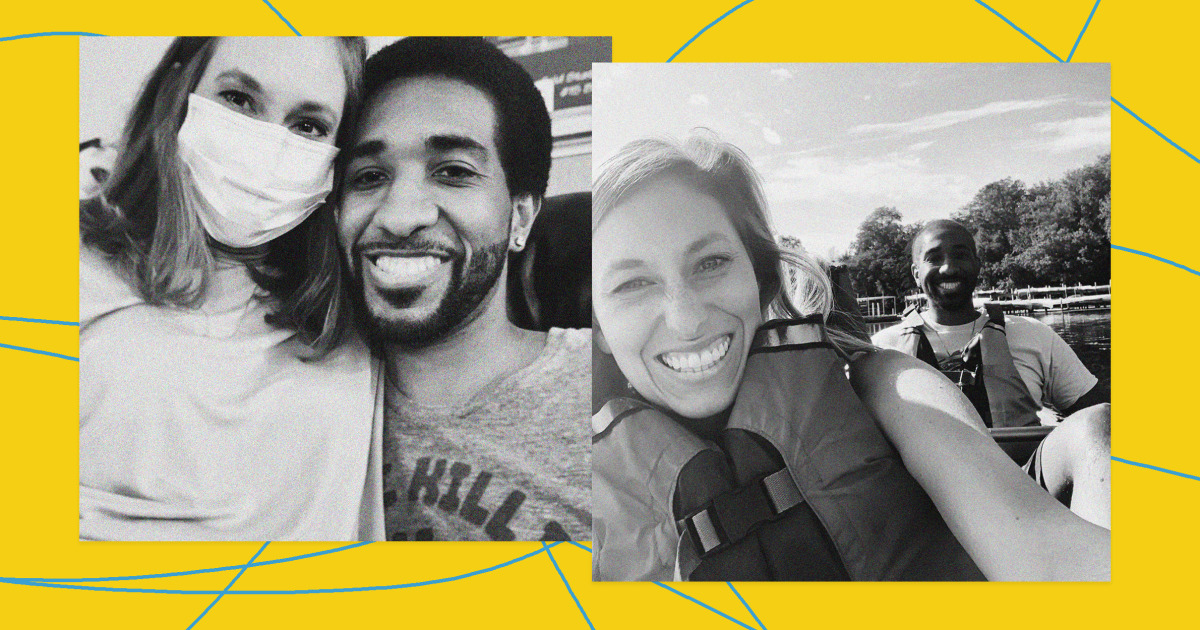
I first met my partner’s family in a hospital lobby in November of last year — one night, one person at a time, as they left so I could enter. The 2020 late fall Covid-19 surge was accelerating at an alarming rate, and stringent Covid-19 rules permitted only one visitor at a time. And later, that would turn into just one per day. My “meeting the family nerves” were diluted by a mix of sleep deprivation, shock and an intense yearning to help in a meaningful way without overstepping. We’d been dating just for a few months, and his family had known I existed for only a few weeks, though they’d had a hunch when Bryan brought half a peck of apples home. He isn’t the apple-picking type. I still tear up with gratitude every time I consider how difficult it must have been for his family to leave his side so I could visit while we awaited test results that would confirm that he, an active 33-year-old basketball player, had cancer.
Broader vaccination wouldn’t guarantee that patients like Bryan stay safe, but it would greatly limit the spread of the disease — and offer reprieve for cancer patients.
What haunts me most is that while Bryan’s diagnosis was inevitable, our experience since January was — and is — preventable. People in the U.S. are privileged to have easy access to the Covid-19 vaccines at no personal cost, and an overwhelming 200 million, about 72 percent of adults over 18 nationwide, are fully vaccinated (gotten two doses of the mRNA series or received one dose of a single-dose vaccine). But a stubborn minority, including an astounding 37 percent of adults 18 and over in Montgomery County, Ohio, where Bryan and I live, aren’t. With nearly 4 in 10 adults unvaccinated, I worry that “normal” is far from around the corner for us.
Broader vaccination wouldn’t guarantee that patients like Bryan stay safe, but it would greatly limit the spread of the disease — and offer reprieve for cancer patients, who may lack full protection of the Covid-19 vaccines through no fault of their own. Yet, across the country, from Texas to Florida to Ohio, some lawmakers are trying to stop employers from requiring vaccinations. But those requirements may be one of the most effective ways for blood cancer patients and their families to return to normalcy.
Don’t take my word for it. Organizations like the Leukemia & Lymphoma Society, the American Cancer Society Cancer Action Network and the American Lung Association, representing millions of patients, also support vaccination requirements and are concerned about legislation and legal challenges that could undermine them. With uncertainty about the omicron variant of the coronavirus, patient protections are even more critical.Throughout the pandemic, I’d been a stickler for safety. In fact, during the few months we had been dating before his diagnosis, it was the only thing Bryan and I had argued about. In the pre-vaccine days of summer 2020, we chose a first date that would minimize anyone’s risk of infection: drinks on a nearly vacant patio and a trip to the dog park with my hound mix, who immediately adopted Bryan — colloquially “the dog whisperer” — as his dad.
But cancer changes everything. I saw no choice but to spend as much time as possible at his bedside as doctors and nurses tried to stabilize his pain, kidney failure and skyrocketing calcium levels while awaiting test results.
Bryan was diagnosed with multiple myeloma, an incurable blood cancer. It’s the same disease Gen. Colin Powell had. Like Powell, Bryan is Black. But unlike him — and most myeloma patients — Bryan is in his 30s. The American Cancer Society predicts that nearly 35,000 people will be diagnosed with multiple myeloma this year.
African Americans get myeloma at more than twice the rate of white patients. Yet only around one-half of 1 percent of myeloma patients are 34 or younger at the time of diagnosis. Bryan was unlucky enough to be one of them.
Often, when someone is diagnosed with cancer, the “comfort wagon” soon follows. For native Midwesterners like us, friends and family bring full-fat, cheesy casseroles, cards and, most of all, companionship. Yet in November 2020, in-person emotional and physical support were no longer safe, during the time when Bryan, his family and I needed it most.
A study conducted before vaccines were widely available and published in July found that 56 percent of multiple myeloma patients (not yet vaccinated) who contracted Covid-19 in the analysis were hospitalized — and that 18 percent, almost 1 in 5 patients, died. Although we didn’t know the exact odds when he was diagnosed in November last year, we knew enough to know that they weren’t in his favor while chemotherapy left him immunocompromised. So, I did everything I could to minimize the chance that Bryan, who was required to wait until after his treatment to get vaccinated, would be one of them. I refused to be in the same space as him unless I was wearing a mask.
With his immunosuppressant chemotherapy, it was too risky, especially since I was required to work in an office, despite pleading with my boss to let me work from home. At the time, I was an administrative health care worker for a county mental health agency, and I was able to get vaccinated before almost anyone else, receiving my first shot on the last day of 2020. For reasons I can’t understand, only a handful of my colleagues at that health agency chose to get vaccinated at the time. Even worse, some came to work while displaying Covid-19 symptoms. It felt unsafe and unnecessary to be in the office, particularly given that my work could be done efficiently remotely.
In other circumstances, spending more time in the office would have been a welcome distraction. But instead, it became a constant source of uncertainty. I continually worried on the drive home: Would that be the day I’d bring Covid-19 home to him? The risk of breakthrough infection seemed small, but the stakes couldn’t have been higher.
Once you’ve made the sacrifice to sleep with a mask on, the unwillingness of others to get vaccinated seems like an enigma, one adorned with unbelievably selfish entitlement.
As someone who had eliminated virtually all risk from her life to keep Bryan safe — ordering dog food to birthday presents online, avoiding restaurants and even grocery stores — I had no choice but to try to compensate by restricting more things at home. So, for over two months, I slept with a mask. We ate our meals over 6 feet apart. We didn’t kiss. We found some substitutes, like holding hands, but unsurprisingly, kisses are irreplaceable. Even for a writer, the right words to comfort your partner during cancer treatment are elusive at best. But when you can’t be physically close to the person you love — even while in the same room — it starts to feel like you’re desperately grasping to offer something that’s just out of reach.
In my mind, no comfort was worth Bryan’s life. It still isn’t. While I no longer have to wear masks at home, we still make daily sacrifices to keep Bryan safe. I share this not to elicit sympathy for me or Bryan but to encourage others who refuse to employ effective public health measures to think of the many people who are willingly ceding freedom in their own homes to keep their immunocompromised loved ones safe. Your neighbors, colleagues or fellow parents or caregivers you see during school drop-off may be facing a similar battle, silently.
Unlike eschewing a diet during the holidays, there won’t be “cheat days” from Covid-19 caution.
Once you’ve made the sacrifice to sleep with a mask on, the unwillingness of others to get vaccinated seems like an enigma, one adorned with unbelievably selfish entitlement.
Despite an unimaginably difficult and ill-timed year, Bryan and I consider ourselves fortunate. He got treatment without delay and with the comfort of visitors, unlike so many other cancer patients. He recently received his second Covid-19 vaccine shot, and was able to produce antibodies.
But that’s far from a given. Research from the Leukemia & Lymphoma Society shows that about 1 in 4 blood cancer patients fail to produce detectable antibodies after Covid-19 vaccination, leaving them vulnerable to infection. As a result, nearly a year after vaccinations began in the U.S., Bryan and I can’t return to “normal.”
Most of our friends and family are vaccinated and have been more than willing to take extra precautions for Bryan’s sake. And, of course, we have each other to soften the disappointments and keep each other company while we continue to employ many of the “shelter in place” tactics others could abandon months ago. When your world becomes an ongoing saga of calculated risks, nothing seems quite safe. I still have groceries delivered, despite the inflated cost and the frustration of realizing that a key ingredient for your recipe was unavailable. Bryan longs to return to the local YMCA, his go-to place to replace stress with endorphins. We’ve wistfully missed our loved ones’ birthday celebrations, sports events and other important moments.
While those opposing vaccination requirements often do so under the guise of defending “freedom,” ironically, they risk undermining the hope of a return to normal life for cancer patients and those who love them. With the holiday season around the corner, I can’t help but feel deflated. Unlike eschewing a diet during the holidays, there won’t be “cheat days” from Covid-19 caution. For us, there won’t be trips to the mall for Christmas shopping. After watching every Marvel movie — in order — over the last year, we won’t get to see “Spider-Man: No Way Home” in a theater. Instead, everything will continue to be meticulously managed. And until the vaccination numbers improve, freedom will continue to remain elusive for people like Bryan and me.
Source: | This article originally belongs to Nbcnews.com









